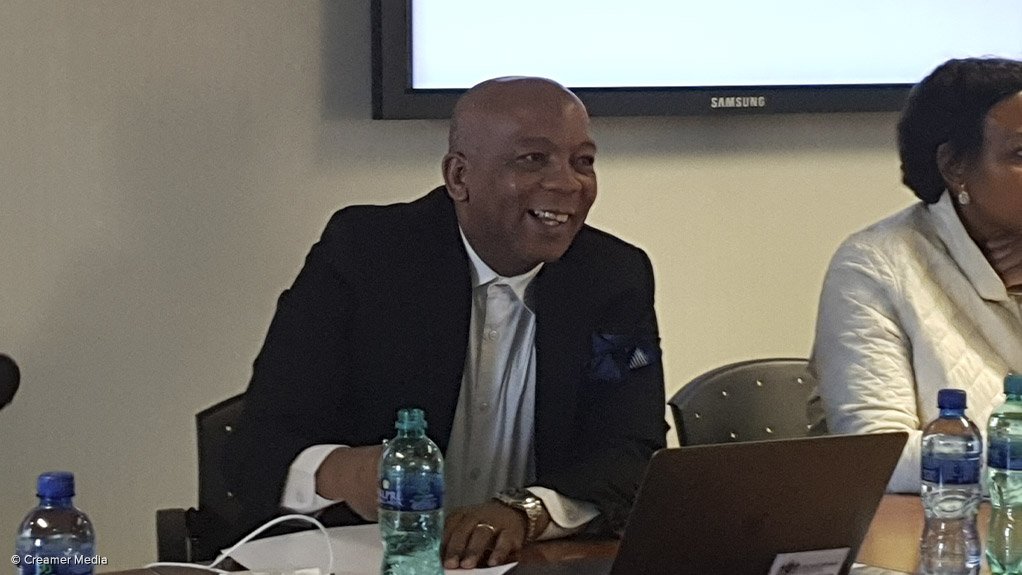Gauteng macroeconomic model to be ready in next 100 days, says Ramokgopa


Gauteng Economic Development, Agriculture and Environment MEC Dr Kgosientso Ramokgopa
Photo by Creamer Media's Simone Liedtke
Gauteng Economic Development, Agriculture and Environment MEC Dr Kgosientso Ramokgopa on Friday told media that a provincial macroeconomic model will be developed and finalised within the next 100 days.
The model would help to address Gauteng’s disproportionate share of responsibilities and would be used as a base for planning for the province’s future.
Despite the province having evolved over time through investments from the private sector and the interventions of national government, Ramokgopa lamented the “unintended consequences of the concentration of investments”.
Further, the majority of the province’s investments can be found in the Ekurhuleni, City of Johannesburg and City of Tshwane metropolitan areas, which he said epitomised spatial inequalities within Gauteng.
Considering that the rest of the province had not seen the same influx of investments, Ramokgopa stressed the “need for deliberate intervention to ensure the resuscitation of the economies on the periphery”.
In outlining his vision for Gauteng’s economy for the next five years, Ramokgopa said these interventions would need to be bold, aggressive, calculated and deliberate in order to use urbanisation as a positive for the province.
As part of the Gauteng macroeconomic model, the province will have access to regional economic profiles, which will identify dominant sectors within a space, as well as what opportunities there are going forward with regard to “making a dent” in unemployment, especially that of the youth, and ensuring the improved skills development and economic share of persons.
All five of the major regions in Gauteng – Ekurhuleni, the West Rand, Sedibeng, the City of Johannesburg and the City of Tshwane – will be listed in the model.
Yearly updates on economic development plan implementation, based on the model, will be provided, Ramokgopa averred.
KEY PRIORITY AREAS
He further identified initial key priority areas for the province, which include addressing challenges surrounding the township economy, multi-tier special economic zones (SEZs), agriculture and agroprocessing, climate change and the green economy.
A more detailed report of the province’s plans will be published after the 100-day deadline.
Thirty per cent of Gauteng’s spend would be ringfenced for township economies and enterprises over the next five years, Ramokgopa said, adding that the province intended to target localisation and product accreditation support to enhance formalisation, competitiveness and market readiness.
To facilitate financial support for township-based enterprises, Ramokgopa placed a call to the market to create a 100% black-owned community financing instrument to address the challenge of access to capital for previously-disadvantaged entrepreneurs and start-ups.
“The support we provide to a commercial enterprise will be offset against a worker-share ownership model, ensuring that productivity is enhanced by workers,” Ramokgopa said, adding that the province was committed to upstream value capture of big-ticket spending, such as that found in the areas of roads, housing and health.
In terms of multi-tier SEZs, the province intended to establish megahub developments in Sedibeng and the West Rand, which Ramokgopa said would be anchored on the agriculture and agroprocessing sectors.
Additionally, the implementation of the automotive SEZ in Tshwane would enhance growth for the automotive sector. A key element of this SEZ was to integrate township re-industrialisation and manufacturing capacity into the procurement value chains at the level of tier two and three suppliers to the automotive original-equipment manufacturers.
Regarding agriculture and agroprocessing, Ramokgopa said the province would commercialise 53 previously-disadvantaged farmers – currently with a combined net yearly turnover of about R500-million – in the horticulture, poultry, grain, piggery and red meat sectors over the next five years.
Besides strengthening and commercialising research in the sector, the province would also establish a West Rand fresh produce market depot, which would result in a reduction in the cost of operation for farmers in the area.
Based on preliminary studies and projections for the feasibility of the project, the province will need about R150-million to get it up and running.
Further, the province will, within the next 100 days, be concluding the Gauteng Sustainability Strategy as part of its objective to mitigate climate change and move towards being a green economy.
The strategy aims to assist the province in its transition to a low-carbon footprint and build resilience in Gauteng, focusing on the mitigation of climate change within the energy, transport, waste, industrial and land-use sectors, as well as the adaption of green measures in water, health, biodiversity, human settlements and disaster risk management sectors.
In this instance, the province plans to reduce the use of fossil fuels, with Ramokgopa stating that Gauteng’s future would “significantly be biased towards the use of renewable energy”.
Access to the Internet and the adoption of Fourth Industrial Revolution technologies, as well as tourism and its development, were also identified as some of the key priority areas for Gauteng.
Article Enquiry
Email Article
Save Article
Feedback
To advertise email advertising@creamermedia.co.za or click here
Press Office
Announcements
What's On
Subscribe to improve your user experience...
Option 1 (equivalent of R125 a month):
Receive a weekly copy of Creamer Media's Engineering News & Mining Weekly magazine
(print copy for those in South Africa and e-magazine for those outside of South Africa)
Receive daily email newsletters
Access to full search results
Access archive of magazine back copies
Access to Projects in Progress
Access to ONE Research Report of your choice in PDF format
Option 2 (equivalent of R375 a month):
All benefits from Option 1
PLUS
Access to Creamer Media's Research Channel Africa for ALL Research Reports, in PDF format, on various industrial and mining sectors
including Electricity; Water; Energy Transition; Hydrogen; Roads, Rail and Ports; Coal; Gold; Platinum; Battery Metals; etc.
Already a subscriber?
Forgotten your password?
Receive weekly copy of Creamer Media's Engineering News & Mining Weekly magazine (print copy for those in South Africa and e-magazine for those outside of South Africa)
➕
Recieve daily email newsletters
➕
Access to full search results
➕
Access archive of magazine back copies
➕
Access to Projects in Progress
➕
Access to ONE Research Report of your choice in PDF format
RESEARCH CHANNEL AFRICA
R4500 (equivalent of R375 a month)
SUBSCRIBEAll benefits from Option 1
➕
Access to Creamer Media's Research Channel Africa for ALL Research Reports on various industrial and mining sectors, in PDF format, including on:
Electricity
➕
Water
➕
Energy Transition
➕
Hydrogen
➕
Roads, Rail and Ports
➕
Coal
➕
Gold
➕
Platinum
➕
Battery Metals
➕
etc.
Receive all benefits from Option 1 or Option 2 delivered to numerous people at your company
➕
Multiple User names and Passwords for simultaneous log-ins
➕
Intranet integration access to all in your organisation


















